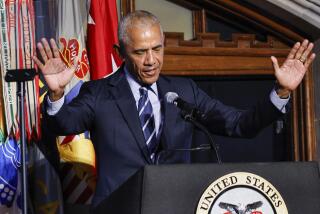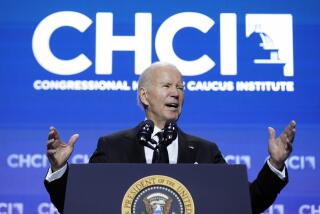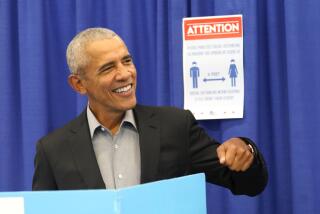Obama choosing midterm campaign targets carefully
- Share via
It would seem an easy call for President Obama: a quick trip home to Illinois to preserve his old Senate seat for the Democratic Party.
But having attached himself to losing candidacies before, Obama has kept a discreet distance from Alexi Giannoulias, an old basketball buddy running for the seat the president once held.
For months, as Obama appeared at fundraising events across the country, he let White House advisors stump for Giannoulias, who was trailing Republican U.S. Rep. Mark Steven Kirk.
Now that polls show Giannoulias has drawn even with Kirk, the terrain is safer for the president, who on Thursday will make his first fundraising appearance for Giannoulias in Chicago.
The president’s upcoming travel schedule offers insights into the harsh reality of November’s midterm elections: For political reasons, the president needs to avoid some candidates, and some candidates need to avoid him. In competitive races where Democrats think Obama’s help could be the difference, he’ll go.
Obama’s road show is the wildcard that Democrats hope will minimize losses in a difficult election year. He is aggressively raising campaign funds — a party priority — with events scheduled in at least seven cities over the next two weeks, starting in Austin and Dallas next week.
Jumping into struggling Democratic campaigns has brought mostly disappointment for Obama. Over the last year, he has tried unsuccessfully to rescue faltering Democratic candidates in New Jersey, Massachusetts and Virginia. Serial defeats eroded his image as a peerless campaigner.
Fair or not, each time Obama gets behind a losing campaign, analysts define the result as a measure of the president’s coattails. Despite Obama’s popularity in Illinois, if he makes numerous appearances for Giannoulias and the candidate loses, the president knows the story will be that he could not even elevate a fellow Democrat in his home state.
So the president is being more selective about where he goes. In a one-month span this spring, Obama flew to California twice to raise money for Sen. Barbara Boxer. Yet until this week, Giannoulias, whose campaign was damaged by revelations about his family’s failed bank, received visits only from White House surrogates.
Giannoulias has rebounded amid questions about Kirk’s truthfulness, creating better conditions for a personal visit from the president.
The White House had waded into the “shallow end of the pool here,” said a Democratic Senate strategist, who requested anonymity so that he could speak more candidly about the White House. “Now they’re bringing out the boss. That’s a level of engagement we haven’t seen thus far. And you’ll find them believing more in Alexi because of Kirk’s” decline.
Deciding exactly where to deploy the president is a complicated calculation. Senate Democratic leader Harry Reid of Nevada has happily stood with Obama during presidential trips to Nevada. But a new Ipsos poll shows that wrapping himself around Obama is likely to make little difference and could even backfire.
Only 11% of Nevadans said that Obama’s endorsement of Reid makes them more likely to support the senator. More than twice as many, 23%, said they’d be less likely to vote for him, and 65% said Obama’s blessing made no difference.
Obama won’t invest time in races where the Democrat is a long shot, party strategists said.
“They’re going to deploy him where he can make a difference in close races,” said Mark Mellman, a Democratic pollster. “You put him in places where on the margins he can make a difference. The people who are way behind are unlikely to get his attention.”
Then there are the candidates who don’t want his attention.
With Obama’s approval rating suffering, some Democrats are edging away from him. In Pennsylvania, a Quinnipiac poll shows that Obama’s favorability rating is upside down: 46% approve, 49% disapprove. Pennsylvanian Joe Sestak, a Democratic candidate for Senate, said recently that Obama had offered to campaign for him, but Sestak would prefer a campaign visit from First Lady Michelle Obama.
When Obama flies to Texas next week to raise money for Senate Democratic candidates and the national party, some Democrats will stay away.
Barbara Ann Radnofsky, who is running for state attorney general, said in an interview: “I have no plans to go.” She cited as one reason her policy differences with Obama over Wall Street. Radnofsky said she supports the more aggressive step of suing Wall Street firms over the financial crisis.
Of the Wall Street firms, she said, “I don’t believe President Obama has taken them on.”
Campaign ads aired by some Democratic candidates toss aside Obama and the rest of the party.
U.S. Rep. Mike McIntyre, a North Carolina Democrat who is part of the fiscally conservative “Blue Dog” caucus, aired a TV spot in which a local businesswoman says she sometimes wished “we could just get rid of everyone in Washington — everyone except Mike McIntyre.”
Behind the scenes, though, the White House and Democrats are working together. Senior White House advisor David Axelrod met with Democratic congressional leaders on Capitol Hill in recent weeks to forge a uniform campaign message. They agreed to drive home the argument that Republicans would revert to policies embraced by an unpopular ex-president: George W. Bush.
Congressional Democrats were pleased to see Obama make a more spirited condemnation of Republicans at a fundraising event Monday in Atlanta — even mentioning Bush by name, one House Democratic aide said.
Democrats “would like to see more of that” from Obama, the aide said. “We’re on the same page in terms of messaging, but they’d like to see him be a little more aggressive.”
peter.nicholas@latimes.com
michael.memoli@latimes.com
More to Read
Get the L.A. Times Politics newsletter
Deeply reported insights into legislation, politics and policy from Sacramento, Washington and beyond. In your inbox twice per week.
You may occasionally receive promotional content from the Los Angeles Times.











